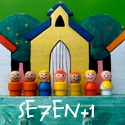I often hear excellent sermons that I would love to share about on my blog. Like most of the things I would love to share on my blog, they never quite make it here. This time, though, it is finally happening!
A few weeks ago we had a visiting preacher from England, Pete Woodcock, at my church. He spoke on Philippians 4. As you may have gathered from some of my posts, I have been having a tough time being content this year. I keep repenting, and keep failing. So I was grateful to hear a sermon on joy and contentment. I can't say I've improved since hearing it, but I am grateful for the reminder of where true joy lies. Here are some of the points Pete made, taken from my notes.
Question: What takes your joy? What makes you discontent?
These things can be broken down into rough categories:
1. Relationships
2. Circumstances
3. Worries
4. Wrong thinking
God wants to rub it in that we are to rejoice (Phillipians 4:4). We can do this because we have a relationship with God. We need to trust he is in control, pray, and think right.
We are easily side tracked into putting our energy in the wrong places. Put your energy into rejoicing in the Lord. Devotion to the wrong things will kill your joy and bring discontentment.
1 Tim 6:6-8 For godliness with contentment is great gain, for we brought nothing into this world and it is certain we can take nothing out. Therefore, if we have food and clothing, with these we shall be content.
Hebrews 13:5 Make sure that your character is free from the love of money, being content with what you have; for He Himself has said, "I WILL NEVER DESERT YOU, NOR WILL I EVER FORSAKE YOU,"
You have God! Rejoice in Him! When you have God, that is everything. If you rejoice in the Lord, you will get your thinking right. Your resources and your future are in God.
We live in a time when people are utterly discontented. We need to shine out satisfaction in God. Be satisfied within yourself, not needing anything from the world (except food, drink, and warmth). You only need God. Be Christ-sufficient.
Biblical contentment is not indifference, not the absence of emotions. It has been said, the Stoics: "Make the heart a desert, and call it peace." This is not what we are called to. There is a time to weep. Contentment does not mean things will not hurt. But there is something bigger than the hurts - God. God's peace transcends understanding (4:7). The God of peace is personally with you.
1. Right relationships will bring a joy in the Lord (4:2-3). Rejoice in the Lord and divisiveness will go away (provided it is a personality problem, not a doctrinal, error problem). Joy comes in serving in relationships. Even though there are differences, they recognise those they differ with are in the Lord and that is the most important thing.
2. Right focus (4:6-7). Anxiety throttles us and chokes out the truth, so we are unable to bear fruit. Anxieties drain us and cut off our motivation. God's remedy: worry about nothing, pray about everything. Transfer everything on your worry list to your prayer list! We often worry about non-essentials or future scenarios instead of rejoicing in the big, good things God has given us in the present. Worry = self focus. Prayer = God focus, puts God at the center.
3. Right thinking. Feed your mind with positive things (4:8). Think on Christ. He is the epitome of all the things mentioned in this passage (lovely, true, noble, virtuous, etc.). See how everything relates to Christ.
4. A right trust (4:10-19) in the one who is in control. Confidence in God's providence. Paul had a patient confidence in God's providence. God has the times and seasons in his hand. When you start trying to take control, you become discontent and worry. Realise God is in control of the fact that you haven't been healed yet, or you don't have something you want. There are two ways God can act: 1) miracles. 2) working out millions and millions of events to accomplish his plan - providence! Which is harder? Which is more complex?
Our first reaction to a discontent person should be to teach them about God's sovereign control. Teach them not to try and manipulate things and take too much upon themselves.
Conclusion: Our culture is not content with little or with much. It is a consumer age. We constantly think we need more. Christians who rejoice in having enough can be a wonderful witness. Shopping is the national pastime in Britain. The average person receives 2,000 ad messages per day. All saying: be discontent. We have turned our wants into needs. Food, clothing, warmth, friends are needs. There is nothing wrong with wanting something - it is wrong to turn it into a need or a right. For example, many couples want a baby and there is nothing wrong with that. However, it is wrong when those couples decide it is their right to have one and they should be able to do whatever they like to get one - including processes that kill embryos. If only we could see that God is what we need. Even Christians are always falling for ads. When you have the Lord, you can do anything (4:13). You'll be able to be poor, rich, mistreated, or comfortable and still be content.
Read more...






















